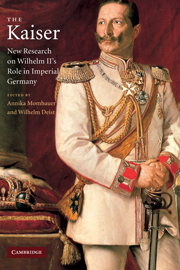Book contents
- Frontmatter
- Contents
- Notes on contributors
- Acknowledgements
- List of abbreviations
- Introduction
- Reflections on John Röhl: a Laudatio
- 1 Wilhelm II and ‘his’ navy, 1888–1918
- 2 Hollow-sounding jubilees: forms and effects of public self-display in Wilhelmine Germany
- 3 The Kaiser's elite? Wilhelm II and the Berlin administration, 1890–1914
- 4 Wilhelm, Waldersee, and the Boxer Rebellion
- 5 Dreams of a German Europe: Wilhelm II and the Treaty of Björkö of 1905
- 6 The uses of ‘friendship’. The ‘personal regime’ of Wilhelm II and Theodore Roosevelt, 1901–1909
- 7 Military diplomacy in a military monarchy? Wilhelm II's relations with the British service attachés in Berlin, 1903–1914
- 8 Wilhelm II as supreme warlord in the First World War
- 9 Germany's ‘last card’. Wilhelm II and the decision in favour of unrestricted submarine warfare in January 1917
- 10 Military culture, Wilhelm II, and the end of the monarchy in the First World War
- 11 Rathenau, Wilhelm II, and the perception of Wilhelminismus
- 12 Structure and agency in Wilhelmine Germany: the history of the German Empire – past, present, and future
- Index
11 - Rathenau, Wilhelm II, and the perception of Wilhelminismus
Published online by Cambridge University Press: 24 July 2009
- Frontmatter
- Contents
- Notes on contributors
- Acknowledgements
- List of abbreviations
- Introduction
- Reflections on John Röhl: a Laudatio
- 1 Wilhelm II and ‘his’ navy, 1888–1918
- 2 Hollow-sounding jubilees: forms and effects of public self-display in Wilhelmine Germany
- 3 The Kaiser's elite? Wilhelm II and the Berlin administration, 1890–1914
- 4 Wilhelm, Waldersee, and the Boxer Rebellion
- 5 Dreams of a German Europe: Wilhelm II and the Treaty of Björkö of 1905
- 6 The uses of ‘friendship’. The ‘personal regime’ of Wilhelm II and Theodore Roosevelt, 1901–1909
- 7 Military diplomacy in a military monarchy? Wilhelm II's relations with the British service attachés in Berlin, 1903–1914
- 8 Wilhelm II as supreme warlord in the First World War
- 9 Germany's ‘last card’. Wilhelm II and the decision in favour of unrestricted submarine warfare in January 1917
- 10 Military culture, Wilhelm II, and the end of the monarchy in the First World War
- 11 Rathenau, Wilhelm II, and the perception of Wilhelminismus
- 12 Structure and agency in Wilhelmine Germany: the history of the German Empire – past, present, and future
- Index
Summary
Walther Rathenau, one of Germany's leading industrialists, bankers, and widely read authors, has often been regarded as a critic of his time in general, and of Wilhelmine Germany in particular. However, his vigour of criticism with regard to the latter was not in the same league as that of his one-time friend, Maximilian Harden, the editor of the influential paper, Die Zukunft, or that of the political left. In the field of politics, Rathenau restricted himself to complaints about some constitutional deficits and about the Prussian state's treatment of the Jewish minority in Germany. Despite these criticisms he identified strongly with the pre-war political system and Wilhelmine Germany in general. He did not want to overthrow anything. His liberal reformist aims were to strengthen Wilhelmine Germany abroad and to integrate the entirety of the German population more strongly with the state. This dialectic approach to politics and to affairs of society in general raises the question as to whether the label Wilhelminist is an appropriate one to describe his position.
Given his close identification with the Wilhelmine epoch, it was not surprising that Rathenau was deeply shocked by the military and political collapse of Imperial Germany in November 1918. One of his reactions to the newly developing political and social circumstances was the publication, among many articles and booklets, of a tract in March 1919 with the title Der Kaiser. In the first parts of this book he analysed the monarchy under Wilhelm II in Germany.
- Type
- Chapter
- Information
- The KaiserNew Research on Wilhelm II's Role in Imperial Germany, pp. 259 - 280Publisher: Cambridge University PressPrint publication year: 2003



